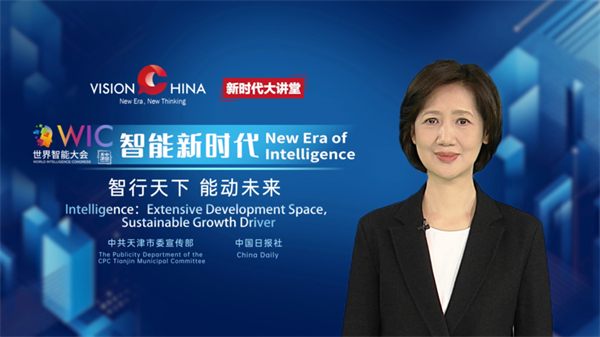
- Home
- Media Center
-
Events
- Wuzhen Summit
- Regional Forums
- Practice Cases of Jointly Building a Community with a Shared Future in Cyberspace
- World Internet Conference Awards for Pioneering Science and Technology
- The Light of Internet Expo
- Straight to Wuzhen Competition
- Global Youth Leadership Program
- WIC Distinguished Contribution Award
- Membership
- Research & Cooperation
- Digital Academy
-
Reports
- Collection of cases on Jointly Building a Community with a Shared Future in Cyberspace
- Collection of Shortlisted Achievements of World Internet Conference Awards for Pioneering Science and Technology
- Reports on Artificial Intelligence
- Reports on Cross—Border E—Commerce
- Reports on Data
- Outcomes of Think Tank Cooperation Program
- Series on Sovereignty in Cyberspace Theory and Practice
- Other Achievements
- About WIC
- 中文 | EN

Tianjin striving to become high-tech hub

Shen Lei, a member of the Standing Committee of the Communist Party of China Tianjin Municipal Committee and head of the committee's Publicity Department, addresses the latest Vision China event in Tianjin on Thursday. CHINA DAILY
With emerging digital technologies like artificial intelligence expanding rapidly around the world, the northern port city of Tianjin plans to bolster efforts to promote development through technological innovation and opening-up, as well as education, technology and a strong workforce, a local senior official said.
Shen Lei, a member of the Standing Committee of the Communist Party of China Tianjin Municipal Committee and head of the committee's Publicity Department, said that in today's world, a new wave in the information technology revolution is in full swing, bringing profound change to industrial development.
"Data, algorithms and computing power have become crucial factors in determining the overall competitiveness of a region or country," she said at the latest Vision China event held on Thursday night.
"We need to harness the power of the new generation of artificial intelligence to drive technological innovation, upgrade industries and boost productivity."
Shen stressed the need to foster advantages in industrial development by vigorously developing the digital economy, accelerating the industrialization of digital technologies and the digital transformation of industries, and promoting the in-depth integration of the internet, big data and artificial intelligence with industries.
During the first quarter of this year, Tianjin's economy showed significant improvement and accelerated growth, with its GDP expanding by 5.5 percent year-on-year to 371.5 billion yuan ($53.3 billion) during the period.
The city's industrial output — a gauge of activity in the manufacturing, mining and utilities sectors — rose by 3.1 percent in the January-March period from a year earlier, after a 1.5 percent rise in the first two months.
Tianjin is shaping up to become a high-tech hub and has rolled out a series of policies to develop the AI sector. It has set up a special fund of 10 billion yuan for intelligent manufacturing, and a 100-billion-yuan industry fund for the new generation of artificial intelligence.
Shen said that as a megacity with over 10 million people and a rich cultural heritage, Tianjin occupies a strategic position in national development and boasts regional, industrial and resource advantages that can help it achieve growth.
She emphasized that Tianjin will deepen reform and opening-up, create a world-class business environment that is market-oriented, law-based, and internationalized, and set up a high-level platform for opening up.
Noting education, science and technology, and human resources as the foundational and strategic pillars for creating a modern socialist country in all respects, Shen said Tianjin will implement its action plan to develop the city through science, education and a highly-skilled workforce.
"This involves close integration between education and industry, between science and the economy, and between workforce building and development, and we shall create a sustainable competitive advantage for Tianjin by turning it into a city with high-quality education, a hub for scientific and technological innovation, and an open platform for attracting top talent," she said.
The Tiankai Higher Education Innovation Park also officially opened on Thursday. Shen explained the name "Tiankai" not only represents the collaboration between the two renowned century-old universities of Tianjin University and Nankai University, but also embodies the idea of revitalization.
The park aims to become a source of scientific and technological innovation, promoting the commercialization of scientific and technological breakthroughs, and the integrated development of innovative industrial chains.

The World Internet Conference (WIC) was established as an international organization on July 12, 2022, headquartered in Beijing, China. It was jointly initiated by Global System for Mobile Communication Association (GSMA), National Computer Network Emergency Response Technical Team/Coordination Center of China (CNCERT), China Internet Network Information Center (CNNIC), Alibaba Group, Tencent, and Zhijiang Lab.





